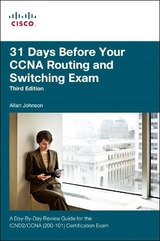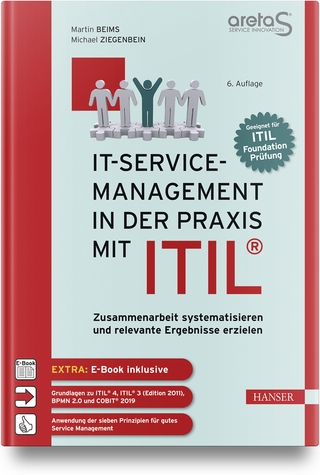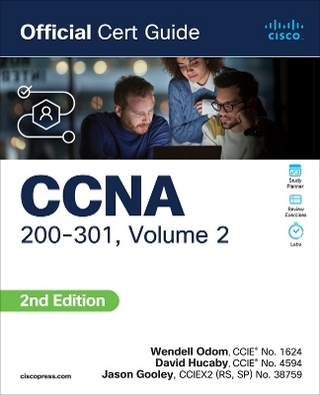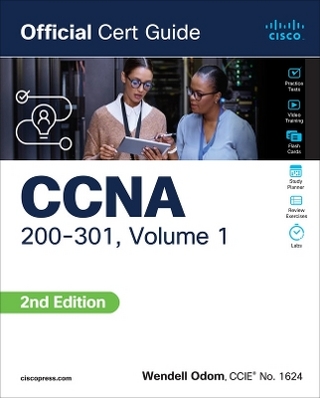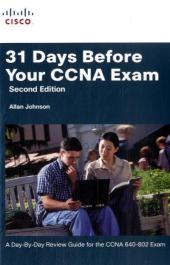
31 Days Before Your CCNA Exam
Cisco Press (Verlag)
978-1-58713-197-4 (ISBN)
- Titel erscheint in neuer Auflage
- Artikel merken
The book breaks down key exam topics into 31 daily review
sessions using short summaries, lists, tables, examples, and graphics. A Study Resources section provides you with a quick reference for locating more in-depth treatment of a day’s topics within the relevant Foundational and Supplemental resources.
Use this day-by-day guide to organize, prepare, and review all the CCNA® objectives. The features of the book empower you to fit exam preparation into an otherwise busy schedule:
Tear out visual calendar summarizes each day’s study topics
Checklist highlights important tasks and deadlines leading up to your exam
Description of the 640-802 CCNA exam organization and sign up process, includes how to use a voucher
Strategies from the author help you to be mentally, organizationally, and physically prepared for exam day
Conversational tone, making your study time more enjoyable
Allan Johnson entered the academic world in 1999 after ten years as a business owner and operator. He has a passion for teaching and holds both an MBA and an M.Ed in occupational training and development. Allan currently works full time developing CCNA instructional support and training materials.
Category: Cisco® Certification
Allan Johnson entered the academic world in 1999 after ten years as a business owner/operator to dedicate his efforts to his passion for teaching. He holds both an MBA and an M.Ed in Occupational Training and Development. He taught CCNA courses at the high school level for seven years and has taught both CCNA and CCNP courses at Del Mar College in Corpus Christi, Texas. In 2003, Allan began to commit much of his time and energy to the CCNA Instructional Support Team providing services to Networking Academy instructors worldwide and creating training materials. He now works full time for the Academy in Learning Systems Development.
Introduction xxv
Part I: Networking Basics 1
Day 31: Network Devices, Components, and Diagrams 3
CCNA 640-802 Exam Topics 3
Key Points 3
Devices 3
Switches 3
Routers 5
Media 5
LANs and WANs 7
Networking Icons 7
Physical and Logical Topologies 8
The Hierarchical Network Model 9
The Enterprise Architecture 10
Network Documentation 11
Study Resources 12
Day 30: Network Models and Applications 13
CCNA 640-802 Exam Topics 13
Key Points 13
The OSI and TCP/IP Models 13
OSI Layers 14
TCP/IP Layers and Protocols 15
Protocol Data Units and Encapsulation 16
Growth of Network-Based Applications 17
Quality of Service 17
Increased Network Usage 17
The Impact of Voice and Video on the Network 18
Study Resources 19
Day 29: Network Data Flow from End-to-End 21
CCNA 640-802 Exam Topics 21
Key Points 21
The TCP/IP Application Layer 21
The TCP/IP Transport Layer 21
TCP Header 22
Port Numbers 23
Error Recovery 24
Flow Control 25
Connection Establishment and Termination 25
UDP 26
The TCP/IP Internet Layer 26
The TCP/IP Network Access Layer 27
Data Encapsulation Summary 28
Using Layers to Troubleshoot 29
Study Resources 29
Part II: Switching Concepts and Configuration 31
Day 28: Connecting Switches and Ethernet Technology 33
CCNA 640-802 Exam Topics 33
Key Topics 33
Ethernet Overview 33
Legacy Ethernet Technologies 34
CSMA/CD 35
Legacy Ethernet Summary 35
Current Ethernet Technologies 36
UTP Cabling 36
Benefits of Using Switches 37
Ethernet Addressing 38
Ethernet Framing 39
The Role of the Physical Layer 40
Study Resources 41
Day 27: Network Segmentation and Switching Concepts 43
CCNA 640-802 Exam Topics 43
Key Topics 43
Evolution to Switching 43
Switching Logic 44
Collision and Broadcast Domains 45
Frame Forwarding 45
Switch Forwarding Methods 45
Symmetric and Asymmetric Switching 46
Memory Buffering 46
Layer 2 and Layer 3 Switching 46
Accessing and Navigating Cisco IOS 46
Connecting to Cisco Devices 46
CLI EXEC Sessions 47
Using the Help Facility 48
CLI Navigation and Editing Shortcuts 48
Command History 49
IOS Examination Commands 50
Subconfiguration Modes 50
Storing and Erasing Configuration Files 51
Study Resources 52
Day 26: Basic Switch Configuration and Port Security 53
CCNA 640-802 Exam Topics 53
Key Topics 53
Basic Switch Configuration Commands 53
Configuring SSH Access 55
Configuring Port Security 56
Shutting Down and Securing Unused Interfaces 58
Study Resources 59
Day 25: Verifying and Troubleshooting Basic Switch Configurations 61
CCNA 640-802 Exam Topics 61
Key Points 61
Troubleshooting Methodology 61
Verifying Network Connectivity 62
Interface Status and the Switch Configuration 65
Interface Status Codes 65
Duplex and Speed Mismatches 66
Common Layer 1 Problems On “Up” Interfaces 67
CDP as a Troubleshooting Tool 68
Study Resources 70
Day 24: Switching Technologies and VLAN Concepts 71
CCNA 640-802 Exam Topics 71
Key Points 71
VLAN Concepts 71
Traffic Types 72
Types of VLANs 72
Voice VLAN Example 73
Trunking VLANs 74
Dynamic Trunking Protocol 75
VTP Concepts 76
VTP Modes 77
VTP Operation 77
VTP Pruning 78
STP Concepts and Operation 78
RSTP Concepts and Operation 80
Configuring and Verifying STP 82
PVST+, PVRST, and MIST 82
Configuring and Verifying the BID 82
PortFast 84
Configuring RSTP 84
Troubleshooting STP 84
Study Resources 85
Day 23: VLAN and Trunking Configuration and Troubleshooting 87
CCNA 640-802 Exam Topics 87
Key Points 87
Sample Topology 87
VLAN Configuration and Verification Commands 88
Configuring and Verifying Trunking 91
Troubleshooting VLAN and Trunking Problems 93
Study Resources 95
Day 22: VTP and InterVLAN Routing Configuration and Troubleshooting 97
CCNA 640-802 Exam Topics 97
Key Points 97
VTP Configuration and Verification 97
VTP Troubleshooting 102
Inter-VLAN Routing Configuration and Verification 103
Troubleshooting Inter-VLAN Routing 105
Study Resources 106
Part III: Addressing the Network 107
Day 21: IPv4 Address Subnetting 109
CCNA 640-802 Exam Topics 109
Key Topics 109
IPv4 Addressing 109
Header Format 109
Classes of Addresses 110
Purpose of the Subnet Mask 111
Subnetting in Four Steps 112
Determine How Many Bits to Borrow 113
Determine the New Subnet Mask 114
Determine the Subnet Multiplier 114
List the Subnets, Host Ranges, and Broadcast Addresses 114
Subnetting Example 1 114
Subnetting Example 2 115
Subnetting Example 3 115
VLSM 116
Summarizing Subnet Addresses 118
Private and Public IP Addressing 119
Study Resources 120
Day 20: Host Addressing, DHCP, and DNS 123
CCNA 640-802 Exam Topics 123
Key Topics 123
Addressing Devices 123
ARP 124
DNS 126
DHCP 127
Configuring on a Cisco Router as a DHCP Server 128
Network Layer Testing Tools 132
Ping 132
Study Resources 134
Day 19: Basic IPv6 Concepts 137
CCNA 640-802 Exam Topics 137
Key Topics 137
Overview of IPv6 137
IPv6 Address Structure 139
Conventions for Writing IPv6 Addresses 139
Conventions for Writing IPv6 Prefixes 139
IPv6 Global Unicast Address 140
Reserved, Private, and Loopback Addresses 141
The IPv6 Interface ID and EUI-64 Format 141
IPv6 Address Management 142
Transitioning to IPv6 142
Study Resources 144
Part IV: Routing Concepts and Configuration 145
Day 18: Basic Routing Concepts 147
Key Topics 147
Packet Forwarding 147
Path Determination and Switching Function Example 148
Routing Methods 149
Classifying Dynamic Routing Protocols 150
IGP and EGP 150
Distance Vector Routing Protocols 150
Link-State Routing Protocols 151
Classful Routing Protocols 151
Classless Routing Protocols 152
Dynamic Routing Metrics 152
Administrative Distance 153
IGP Comparison Summary 154
Routing Loop Prevention 155
Link-State Routing Protocol Features 156
Building the LSDB 156
Calculating the Dijkstra Algorithm 157
Convergence with Link-State Protocols 158
Study Resources 158
Day 17: Connecting and Booting Routers 161
CCNA 640-802 Exam Topics 161
Key Topics 161
Router Internal Components 161
IOS 162
Router Bootup Process 162
Router Ports and Interfaces 164
Router Connections 164
Study Resources 166
Day 16: Basic Router Configuration and Verification 167
CCNA 640-802 Exam Topics 167
Key Topic 167
Basic Router Configuration 167
Verifying Network Connectivity 175
Study Resources 177
Day 15: Managing Cisco IOS and Configuration Files 179
CCNA 640-802 Exam Topics 179
Key Topics 179
The Cisco IOS File System 179
IFS Commands 179
URL Prefixes for Specifying File Locations 181
Commands for Managing Configuration Files 182
Cisco IOS File Naming Conventions 182
Manage IOS Images 183
Backing Up an IOS image 184
Restoring an IOS Image 185
Recovering an IOS Image Using a TFTP Server 186
Recovering an IOS Image Using Xmodem 187
Recovering a Lost Password 188
Study Resources 189
Day 14: Static, Default, and RIP Routing 191
CCNA 640-802 Exam Topics 191
Key Topics 191
Static Route Configuration 191
Static Routes Using the “Next Hop” Parameter 193
Static Routes Using the Exit Interface Parameter 193
Default Static Routes 194
RIP Concepts 197
RIPv1 Message Format 197
RIPv1 Operation 198
RIPv1 Configuration 198
RIPv1 Verification and Troubleshooting 199
Passive Interfaces 203
Automatic Summarization 204
Default Routing and RIPv1 206
RIPv2 Configuration 207
Disabling Autosummarization 208
RIPv2 Verification and Troubleshooting 208
Study Resources 209
Day 13: EIGRP Routing 211
CCNA 640-802 Exam Topics 211
Key Topics 211
EIGRP Operation 211
EIGRP Message Format 212
RTP and EIGRP Packet Types 212
DUAL 214
Administrative Distance 214
EIGRP Configuration 214
The network Command 215
Automatic Summarization 216
Manual Summarization 217
EIGRP Default Route 219
Modifying the EIGRP Metric 219
Modifying Hello Intervals and Hold Times 220
EIGRP Verification and Troubleshooting 221
Study Resources 226
Day 12: OSPF Routing 227
CCNA 640-802 Exam Topics 227
Key Topics 227
OSPF Operation 227
OSPF Message Format 227
OSPF Packet Types 228
Neighbor Establishment 228
Link-State Advertisements 229
OSPF Network Types 230
DR/BDR Election 230
OSPF Algorithm 231
Link-State Routing Process 232
OSPF Configuration 233
The router ospf Command 234
The network Command 234
Router ID 235
Modifying the OSPF Metric 236
Controlling the DR/BDR Election 237
Redistributing a Default Route 238
Modifying Hello Intervals and Hold Times 238
Verifying and Troubleshooting OSPF 239
Study Resources 243
Day 11: Troubleshooting Routing 245
CCNA 640-802 Exam Topics 245
Key Topics 245
The Basic Commands 245
VLSM Troubleshooting 246
Discontiguous Networks 246
Troubleshooting RIP 247
Troubleshooting EIGRP and OSPF Interface Issues 248
Troubleshooting Neighbor Adjacency Issues 249
Study Resources 250
Part V: Wireless Concepts and Configuration 251
Day 10: Wireless Standards, Components, and Security 253
CCNA 640-802 Exam Topics 253
Key Topics 253
Wireless Standards 253
Wireless Modes of Operation 254
Wireless Frequencies 254
Wireless Encoding and Channels 255
Wireless Coverage Area 256
CSMA/CA 256
Wireless Security Risks 257
Wireless Security Standards 258
Study Resources 259
Day 9: Configuring and Troubleshooting Wireless Networks 261
CCNA 640-802 Exam Topics 261
Key Topics 261
Implementing a WLAN 261
Wireless LAN Implementation Checklist 262
Wireless Troubleshooting 264
Study Resources 264
Part VI: Basic Security Concepts and Configuration 265
Day 8: Mitigating Security Threats and Best Practices 267
CCNA 640-802 Exam Topics 267
Key Topics 267
The Importance of Security 267
Attacker Terminology 267
Thinking Like an Attacker 268
Balancing Security and Availability 269
Developing a Security Policy 269
Common Security Threats 270
Vulnerabilities 270
Threats to Physical Infrastructure 271
Threats to Networks 271
Types of Network Attacks 271
General Mitigation Techniques 273
Host and Server Security 273
Intrusion Detection and Prevention 273
Security Appliances and Applications 273
Maintaining Security 275
Study Resources 276
Part VII: ACL and NAT Concepts and Configuration 277
Day 7: ACL Concepts and Configurations 279
CCNA 640-802 Exam Topics 279
Key Topics 279
ACL Concepts 279
Defining an ACL 279
Processing Interface ACLs 279
Types of ACLs 280
ACL Identification 281
ACL Design Guidelines 281
Configuring Standard Numbered ACLs 282
Standard Numbered ACL: Permit Specific Network 282
Standard Numbered ACL: Deny a Specific Host 283
Standard Numbered ACL: Deny a Specific Subnet 283
Standard Numbered ACL: Deny Telnet Access to the Router 284
Configuring Extended Numbered ACLs 284
Extended Numbered ACL: Deny FTP from Subnets 285
Extended Numbered ACL: Deny Only Telnet from Subnet 285
Configuring Named ACLs 286
Standard Named ACL Steps and Syntax 286
Standard Named ACL: Deny a Single Host from a Given Subnet 286
Extended Named ACL Steps and Syntax 287
Extended Named ACL: Deny a Telnet from a Subnet 287
Adding Comments to Named or Numbered ACLs 287
Complex ACLs 288
Study Resources 288
Day 6: Verifying and Troubleshooting ACL Implementations 289
CCNA 640-802 Exam Topics 289
Key Topics 289
Verifying ACLs 289
Troubleshooting ACLs 291
Problem 1: Host Has No Connectivity 291
Problem 2: Denied Protocols 292
Problem 3: Telnet is Allowed #1 293
Problem 4: Telnet Is Allowed #2 294
Problem 5: Telnet Is Allowed #3 294
Study Resources 295
Day 5: NAT Concepts, Configuration, and Troubleshooting 297
CCNA 640-802 Exam Topics 297
Key Topics 297
NAT Concepts 297
A NAT Example 298
Dynamic and Static NAT 299
NAT Overload 299
NAT Benefits 300
NAT Limitations 300
Configuring Static NAT 301
Configuring Dynamic NAT 301
Configuring NAT Overload 303
Verifying NAT 303
Troubleshooting NAT 304
Study Resources 306
Part VIII: WAN Concepts and Configuration 307
Day 4: WAN and VPN Technologies 309
CCNA 640-802 Exam Topics 309
Key Topics 309
WAN Technology Concepts 309
WAN Components and Devices 309
WAN Physical Layer Standards 311
WAN Data Link Protocols 312
WAN Switching 312
WAN Connection Options 313
Dedicated Connection Options 314
Circuit-Switched Connection Options 314
Packet-Switched Connection Options 315
Internet Connection Options 317
Choosing a WAN Link Option 319
VPN Technology 320
VPN Benefits 320
Types of VPN Access 320
VPN Components 322
Establishing Secure VPN Connections 322
Study Resources 326
Day 3: PPP Configuration and Troubleshooting 329
CCNA 640-802 Exam Topics 329
Key Topics 329
HDLC 329
HDLC Encapsulation 329
Configuring HDLC 330
Verifying HDLC 331
PPP Concepts 331
The PPP Frame Format 331
PPP Link Control Protocol (LCP) 332
PPP Configuration and Verification 334
Basic PPP 334
Study Resources 336
Day 2: Frame Relay Configuration and Troubleshooting 337
CCNA 640-802 Exam Topics 337
Key Topics 337
Frame Relay Concepts 337
Frame Relay Components 338
Frame Relay Topologies 339
NBMA Limitations and Solutions 340
Inverse ARP and LMI Concepts 341
Inverse ARP and LMI Operation 342
Configuring and Verifying Frame Relay 343
Full Mesh with One Subnet 344
Partial Mesh with One Subnet per PVC 347
Frame Relay Verification 348
Troubleshooting WAN Implementations 349
Troubleshooting Layer 1 Problems 350
Troubleshooting Layer 2 Problems 350
Troubleshooting Layer 3 Problems 351
Study Resources 352
Day 1: CCNA Skills Review and Practice 353
Key Topics 353
CCNA Skills Practice 353
Introduction 353
Topology Diagram 353
Addressing Table 354
VLAN Configuration and Port Mappings 355
ISP Configuration 355
Task 1: Configure Frame Relay in a Hub-and-Spoke Topology 356
Task 2: Configure PPP with CHAP 356
Task 3: Configure Static and Dynamic NAT on HQ 356
Task 4: Configure Default Routing 357
Task 5: Configure Inter-VLAN Routing 357
Task 6: Configure and Optimize EIGRP Routing 357
Task 7: Configure VTP, Trunking, the VLAN Interface, and VLANs 357
Task 8: Assign VLANs and Configure Port Security 358
Task 9: Configure STP 358
Task 10: Configure DHCP 359
Task 11: Configure a Firewall ACL 359
CCNA Skills Practice (Answers) 360
Task 1: Configure Frame Relay in a Hub-and-Spoke Topology 360
Task 2: Configure PPP with CHAP 362
Task 3: Configure Static and Dynamic NAT on HQ 362
Task 4: Configure Default Routing 364
Task 5: Configure Inter-VLAN Routing 364
Task 6: Configure and Optimize EIGRP Routing 365
Task 7: Configure VTP, Trunking, the VLAN Interface, and VLANs 367
Task 8: Assign VLANs and Configure Port Security 369
Task 9: Configure STP 370
Task 10: Configure DHCP 371
Task 11: Configure a Firewall ACL 372
CCNA Skills Challenge 374
Part IX: Exam Day and Post-Exam Information 375
Exam Day 377
What You Need for the Exam 377
What You Should Receive After Completion 377
Summary 378
Post-Exam Information 379
Receiving Your Certificate 379
Determining Career Options 379
Examining Certification Options 380
If You Failed the Exam 380
Summary 380
TOC, 1587131978, 10/21/08
| Erscheint lt. Verlag | 20.11.2008 |
|---|---|
| Verlagsort | Indianapolis |
| Sprache | englisch |
| Maße | 153 x 229 mm |
| Gewicht | 572 g |
| Themenwelt | Mathematik / Informatik ► Informatik ► Netzwerke |
| Informatik ► Weitere Themen ► Zertifizierung | |
| ISBN-10 | 1-58713-197-8 / 1587131978 |
| ISBN-13 | 978-1-58713-197-4 / 9781587131974 |
| Zustand | Neuware |
| Informationen gemäß Produktsicherheitsverordnung (GPSR) | |
| Haben Sie eine Frage zum Produkt? |
aus dem Bereich
